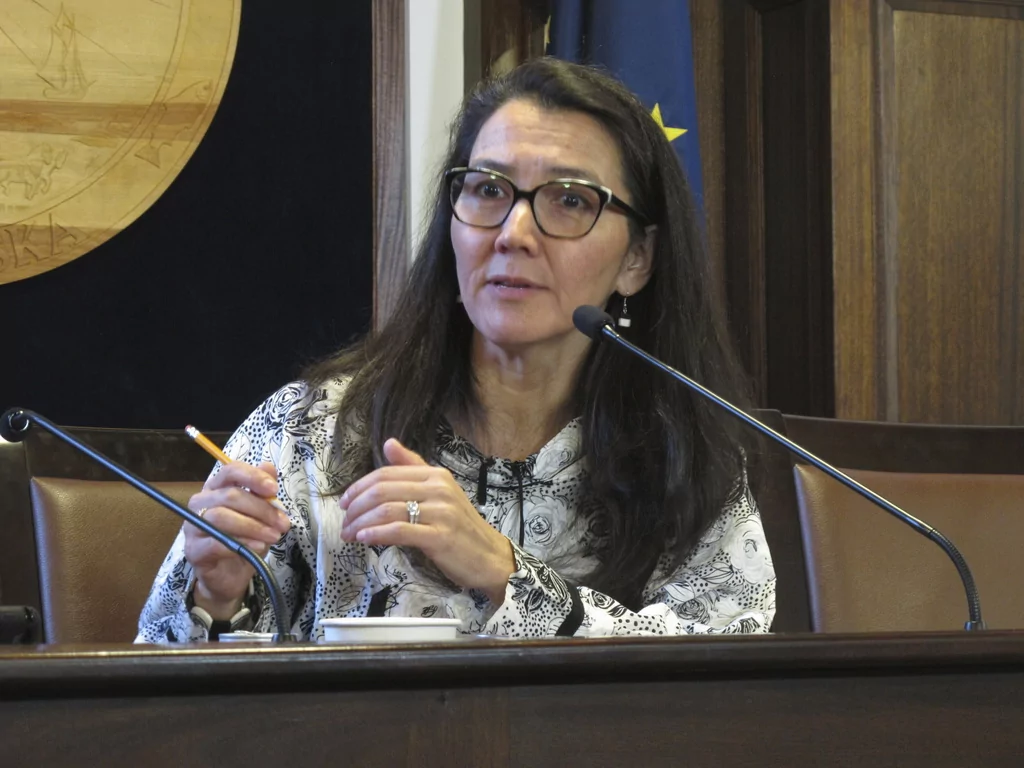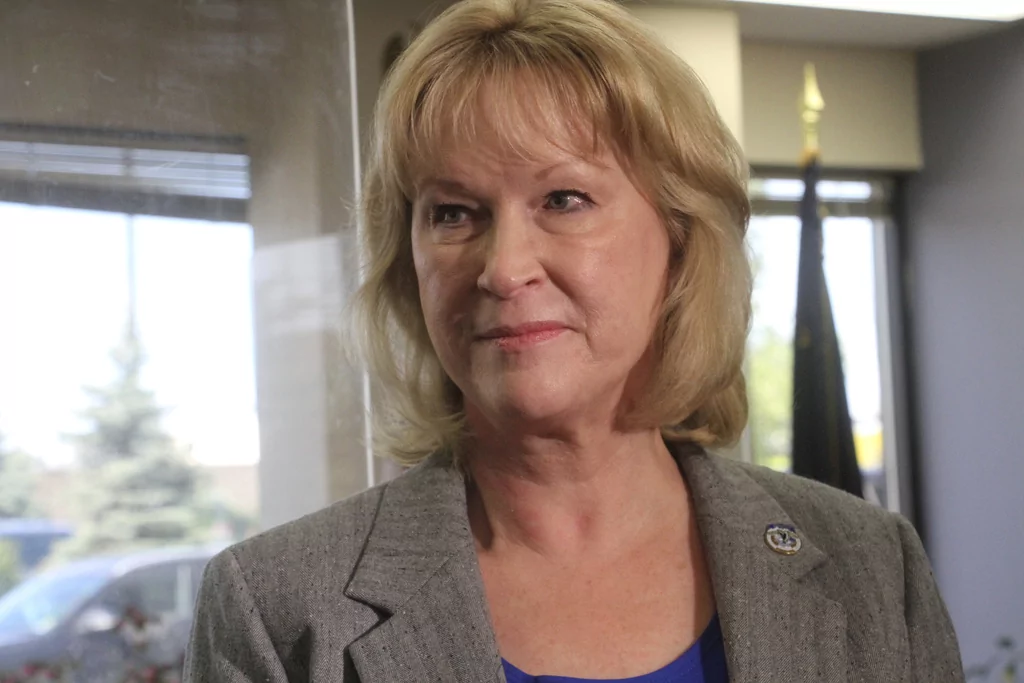Rep. Mary Peltola (D-AK) is the sole representative of the Last Frontier State, with her survival in Tuesday’s primary relying on her centrist standing among Democrats and a unique voting system that has prevented Republicans from winning seats perceived as easy pick-ups in the past.
Peltola won a special election in 2022, making her the first woman to represent Alaska in the U.S. House of Representatives and the first Democrat to represent the state in 50 years. She defeated 47 contenders in the special primary, including former Republican governor and vice presidential candidate Sarah Palin.
Palin thought her House bid would be the ticket to a national political comeback, but the former governor suffered two losses in three months to Peltola thanks to ranked choice voting — a voting-by-preference system that Alaska approved in 2020, used in 2022, and will be the method again in 2024.
However, a group of voters represented by former Alaska Republican Attorney General Kevin Clarkson are pushing for a ballot measure that would repeal the ranked choice voting system. Ten GOP-controlled states have banned ranked choice voting so far, with five doing so in the last few months. More states are awaiting voter judgment on banning the practice at the ballot box.

Ranked choice voting: A thorn in Republicans’ sides
Part of Peltola’s success derived from the ranked choice voting system used in Alaska, allowing her to gain not only Democratic votes but those from Republicans and independents, as well.
Ranked choice voting has been a constant thorn in the Republican Party’s side in recent years after several GOP candidates have failed to flip seats thought easily winnable due to the ballot system often splitting support between two or more candidates. Though only used in two states, losses in relatively solid Republican states have irked the GOP so much that many states have banned the system without ever using it.
Alaska’s primary and general elections do not follow conventional ballot practices. In the primary, all candidates are included on one ballot, regardless of party affiliation. The top four vote-getters will advance to the general election. Other states that engage in “multi-party” or “garbage” primaries are California, Louisiana, Nebraska, and Washington.
In the general election, Alaskans have ranked choice voting, where they rank the candidates in order of preference rather than choosing a single candidate. If one candidate receives more than 50% of the first-choice vote count in the initial count, that candidate wins. If not, the votes will be reallocated based on those eliminated. Maine also uses ranked choice in federal and statewide elections.
For Republicans, ranked choice voting has cost them five congressional seats since Maine adopted the practice in 2018 and Alaska did so in 2022: three seats in Maine between 2018, 2020, and 2022, and the 2022 special and general elections in Alaska.
Peltola won both the House special election in August 2022 and a full term in November that year, defeating Palin, who was on both ballots, twice in less than three months. After Peltola’s first victory was announced, Palin had called the ranked choice voting system “crazy, convoluted, confusing.”
Jacob Rubashkin, deputy editor for Inside Elections, told the Washington Examiner that while Maine and Alaska Republicans lost for several reasons other than ranked choice voting, “if you’re looking at the system and it’s constantly spitting out a result you don’t like, you’re going to have — you might have a real issue with the system.”
Who do Republicans have to thank for Alaska switching to ranked choice? Some strategists say Sen. Lisa Murkowski (R-AK), a centrist Republican who faced difficult challengers in two consecutive cycles from her own party. She lost a primary in 2010 to Republican challenger Joe Miller but beat him in the general election through a write-in campaign. When Miller ran again in 2016, Murkowski won with just 44% of the vote thanks to ranked choice voting.
Rubashkin said allies of Murkowski pushed for the ranked choice voting to help her win the election after two back-to-back instances where an easy reelection for an incumbent was not within her grasp.
“That’s not comfortable for an incumbent to be, and so with the ranked choice, she is basically able to assemble — without having to go through a Republican primary — a more politically diverse coalition of Republicans, independents, and even some Democrats without ever having to face solely Republican primary voters,” Rubashkin said.
Murkowski has blasted the direction she believes the GOP is headed and has repeatedly said she will not back former President Donald Trump as the Republican nominee. She also has not ruled out leaving the Republican Party. Her centrist stance on issues, plus her aversion to the former president, has caused Trump and his supporters to attack her on social media and endorse her opponents.
“Lisa Murkowski’s selfish decision to change Alaska’s voting laws for her own primary has put Republicans in a tough spot for what should be a solid Republican seat,” a GOP strategist told the Washington Examiner.
The Washington Examiner reached out to Murkowski for comment.
Republicans have also blasted ranked choice voting for “disenfranchising” voters if more Republicans vote than Democrats, but a Democrat is selected as the winner. However, having a single Democratic candidate but two or more Republican candidates will divide the GOP vote, allowing the Democrat to sail to victory.
This occurred in Peltola’s case when Republican Nick Begich received the fewest first-choice votes in the 2022 special election. The votes from Alaskans who ranked Begich first and Peltola or Palin second were reallocated to the women respectively, allowing Peltola to secure enough support and be declared the winner with 51.8% of the vote.
Begich said in an interview with the Washington Examiner that “ballot exhaustion” is also a side effect of ranked choice voting that ultimately makes it harder for Republicans to win.
“Under ranke choice in Alaska, 20 to 30% of folks simply will not rank if they have their preferred candidate,” Begich said. “Perhaps it’s because they don’t like the other options, but perhaps it’s also because folks on the right, a lot of them, really believe one person, one vote, — and it’s their right under ranked choice voting to vote for only one; they’re not forced to rank everyone. And that ballot exhaustion effect can have a significant impact in a tight race.”
Erin Covey, U.S. House analyst for the Cook Political Report, told the Washington Examiner that ranked choice voting typically benefits the candidate who can best consolidate support from all sides of the political spectrum. It can be a Democrat or a Republican, she said, but Democrats have tended to be more successful in attracting independent voters than GOP candidates.
“Even though Peltola was not able to get an outright majority on her own, she was able to close the gap because she had a lot of folks who had voted for either Palin or Begich, or the fourth third-party candidate on the ballot who also saw Peltola and they were like, ‘You know, we don’t feel strongly about her, and she has run in a way that is more moderate, and ran on trying to continue Don Young’s legacy,’” Covey said, referring to Peltola’s predecessor.
“And so she was able to get a decent amount of support for Republicans who are like, ‘Maybe she’s not my first choice, but she would be my second choice,’” Covey continued.
Alaskans for Honest Elections is the political group leading the ballot measure to repeal the ranked-choice primary. The effort faced some pushback after a state judge disqualified several booklets used to gather signatures to qualify the measure for the ballot. Sam Curtis, information officer for the Alaska Department of Law, told the Washington Examiner that the superior court affirmed that the measure qualifies for the ballot, but the decision has been appealed.
The Supreme Court is expected to issue a final decision before Alaska’s elections division sends out ballots in early September, Curtis said.
Begich said he supports the ballot initiative, arguing that ranked choice has been “gamed” by Democrats and eliminates the point of primaries, which grants parties the opportunity to hear different policy platforms and choose one nominee.
“If the Democrats really loved ranked choice voting the way that they say that they do, then they would have four or five candidates that they would offer up in all of their races, both at the state level and then at the federal level, but they’ve only offered up one,” Begich said. “And so they recognize that their best opportunity to get an elected Democrat in a red state is to run one candidate, consolidate early, put all their resources behind that candidate, and allow them to run a very moderate sounding campaign.”

Peltola’s votes against her party challenges GOP messaging
Peltola won the 2022 special election to replace longtime Rep. Don Young, the longest-serving House Republican in history who died of natural causes in March 2022. She is the first Democrat in five decades to hold the position — but her voting record since entering the House has not always been in sync with the Democratic conference.
Though House Republicans are painting Pelota as an “extreme Democrat” in “lock-step loyalty” with the Biden-Harris administration, the at-large Alaska congresswoman is one of a few House Democrats who votes frequently outside party lines on several key issues, such as immigration and energy development.
Pelota was one of four Democrats who voted to denounce the “harmful, anti-American energy policies of the Biden administration” in a GOP-led resolution in March, and she again voted to condemn Vice President Kamala Harris for failing in her duties as “border czar” over the influx of illegal immigrants at the southern border.
On the energy side, she voted for a bill to prevent the administration from banning fracking, which was essentially dead on arrival in the Democratic-controlled Senate. She also voted for a resolution that condemned a carbon tax as “detrimental to the U.S. economy.”
As of March, she voted against the Democratic conference on 78 votes since the start of 2023, with a handful of others occurring in 2024. That’s a vote against the party rate of over 12%, the fourth highest among House Democrats, according to data from ProPublica obtained by Alaska Public Radio.
She has still not endorsed Vice President Kamala Harris, as well, and skipped the Democratic National Committee’s roll call nominating Harris as the Democratic presidential nominee.
Pelota’s aisle crossing reflects the reality of her at-large seat, representing an entire state that Trump won in 2020 by 10 points. A spokesperson for the Democratic Congressional Campaign Committee told the Washington Examiner that Peltola is the “perfect fit for this district.”
“She’ll work with anyone in Congress, regardless of their party, to make sure she’s getting things done,” the spokesperson said. “She’ll stand up to her own party to get things done.”
Rubashkin said Peltola has a different task than other members of her party: keeping a district that leans more Republican happy. He said it is “unsurprising” she would deviate from the conference given the “political reality” of Alaska.
Democrats like Peltola, as well as Rep. Jared Golden (D-ME) and Marie Gluesenkamp Perez (D-WA), need more “flexibility in their votes,” Rubashkin said.
“I would imagine there’s very little ill will toward Peltola for taking some of these votes in a way that a member coming from a safe seat, who was voting against the party line to that great a degree, might cause some consternation,” Rubashkin said.

2024 primary: Republicans on track to repeat 2022 mistakes
Peltola is facing 11 challengers in the primary on Tuesday, a few of whom are familiar faces. Begich is back for round three, hoping to oust Peltola, and Republican Lt. Gov. Nancy Dahlstrom is running for the state’s sole House seat, as well.
The incumbent congresswoman holds a significant fundraising advantage over Begich and Dahlstrom. Peltola’s campaign reported having $2.8 million cash on hand as of July 31, compared to Dahlstrom with $317,617 and Begich with $172,548. Peltola’s campaign has raised more than $7.5 million this cycle, compared to Begich’s $983,000 and Dahlstrom’s $912,000.
Peltola’s reelection coffers and moderate voting record, combined with her double-digit net favorability, give her a slight advantage over her competitors. Having two Republicans in the race, as well, mirrors the loss Republicans took in 2022.
“There’s a tremendous amount of concern that they’re repeating the same mistakes they made in 2022. That is what is keeping Peltola, in my mind, the slight favorite in this race,” Rubashkin said. “Because Republicans are, to an extent, dealing with the same issues they did last cycle.”
Last year, the two Republican choices were Palin, a polarizing candidate — even among the GOP — who ran an unsuccessful presidential campaign and ultimately lost to Barack Obama and Joe Biden in 2008 as John McCain’s running mate, and Begich, a conservative grandson of a famous Democratic family.
GOP infighting during the 2022 race was so bad that Palin’s ex-in-laws donated to Begich’s campaign, per Cook Political Report, and the candidates focused on mudslinging toward each other rather than campaigning against Peltola.
Of the voters who had voted for Begich last year, only 50% of them ranked Palin as their second choice. Of the voters who cast a ballot for Palin, only 57% of them ranked Begich as their second choice. The lack of consolidation behind one Republican candidate cost the party the House seat in 2022.
This year, Republicans appear to be trying to avoid past mistakes. Begich confirmed to the Washington Examiner that he will withdraw from the election if he finishes behind Dahlstrom in the primary, a move he said aims to consolidate support behind one Republican.
The two GOP candidates have also made pledges not to attack each other, instead going after Peltola — a contrast to 2022, when Peltola was able to rally her base through positive messaging while Republicans fell victim to infighting.
“I do think it’s important to remember that it’s not Republicans that we’re fighting against: it’s the ideas that Democrats are presenting that we are battling against, and by maintaining that focus on Democrat policies, we can enhance our ability to replace Mary Peltola going into November,” Begich said.
National Republicans and the NRCC are rallying behind Dahlstrom, who has been involved in politics for over two decades. However, Begich is also gaining several endorsements from local officials and party committees, as well as support from the hard-line conservative House Freedom Caucus. His name recognition from both his family and previous campaign gave him an advantage over Dahlstrom, who has never ran for statewide office until now.
Dahlstrom, who also has the endorsement of Trump, has not made a similar pledge to Begich’s to withdraw from the race if she comes in third. According to the Cook Political Report, polling has shown Begich with a double-digit lead over Dahlstrom for most of the cycle — meaning if she comes in third place, and does not decide to withdraw, Republicans could have another split vote situation on their hands.
“While Lt. Governor Dahlstrom must remain neutral about the rank-choice voting system in Alaska, as prescribed by her official duties, she is looking forward to seeing voters make their voices heard on Tuesday,” Dahlstrom spokesman Houston Keene said in a statement to the Washington Examiner. “President Donald J. Trump, who endorsed the lieutenant governor, said it best: Lt. Governor Nancy Dahlstrom is a ‘proven fighter’ and a ‘winner’ who ‘will not let you down.’”
“Alaskan voters know that and have seen it throughout her career serving the great people of Alaska,” Keene continued. “The Lt. Governor is the only candidate that can beat Mary Peltola, and is building a campaign that will win this November.“
Still, Peltola’s victory is not set in stone — if she wins Tuesday, her ability to win in November will hinge on whether she can maintain the separation between herself and the Democratic Party. She praised President Joe Biden’s mental acuity earlier this year as critics continued to point out the president’s visible decline and voted with him nearly 80% of the time — two areas on which the National Republican Congressional Committee have attacked Peltola in ads aired in July.
CLICK HERE TO READ MORE FROM THE WASHINGTON EXAMINER
“Democrat Mary Peltola sells out Alaska values to side with Biden, Harris and the Squad,” NRCC Chairman Richard Hudson said in a statement to the Washington Examiner. “Alaska is ripe for a Republican pick-up as Alaskans will elect President Trump and a Republican Representative to fight the liberal swamp – not enable it like Peltola.”
The Washington Examiner reached out to Peltola’s campaign for comment.
























